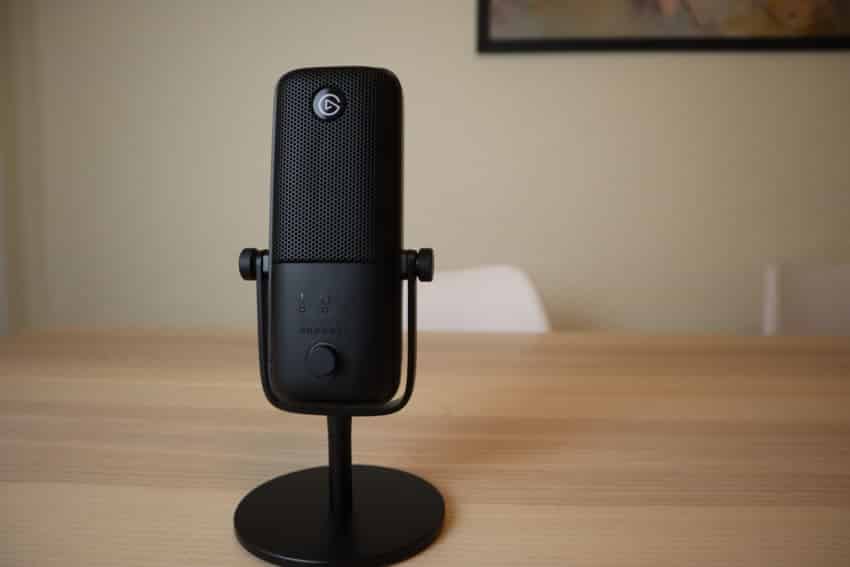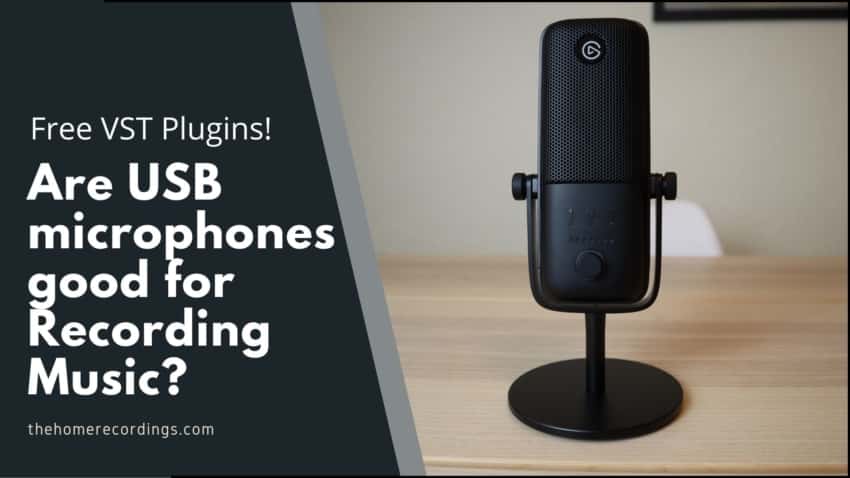Last updated on December 31st, 2023 at 06:00 pm
This is a question I get a lot, and luckily the answer is quite simple: Yes. However, it obviously depends on your needs and on the microphone you get since they are all not then same.
In this article, I will be going into detail of why you might want, or not, a USB microphone for recording music and vocals, their pros & cons, and much more.
In short; High quality USB microphones can work well for recording music. However, they can only record one track at a time, which is why they are generally used on vocals, acoustic guitars, electric guitar cabinets, etc., and not drums, or other instruments that would require multiple microphones. In those cases, a USB Interface plus some XLR microphones is the better choice.
Now, let’s get into the article!
Are USB microphones good for Recording Music?

The cheapest of USB microphones are definitely not suited for recording music, since they are mostly intended to be used to talk over Skype, Zoom, Discord, etc.
If you want to be able to record with a professional sound, then you’ll need to get a premium USB microphone of the likes of an Audio-Technica AT2020 USB, but don’t worry, these won’t cost as much as getting a USB Interface, an XLR microphone and XLR cable.
Of course, what you need to know is that a USB microphone only allows you to record one track at a time, which means that recording drums, for example, will lead to an overall worse sound, plus you won’t be able to mix and process each individual component of the drum set.
If you’re thinking about only recording one instrument at a time that doesn’t require multiple microphones to be recorded properly, like an acoustic guitar, electric guitar cabinet, vocals, etc., then a USB microphone will suit you just fine.
One thing I want to address is that people tend to get too hung up on questions such as “what’s the best gear?”, without realizing that the equipment you use doesn’t have as great of an impact on your sound as you might think. As long as you have a decent setup, not necessarily an expensive one, you should be good to go. So, don’t overthink it!
It is also worth noting that there are some advantages, as well as disadvantages, to using a USB microphone, so let’s quickly cover those.
What are the advantages of using a USB microphone?
Ease of use: USB microphones are plug and play, and this means that you simply connect it to your computer and you’re ready to record. In some instances, you might need to select the mic as the input device in your Sound Settings, but that’s about it, no drivers needed.
All in one: USB microphones come with the Audio Interface and preamp already built in, which means that no additional equipment will be needed (except a USB cable, but those always come included).
Lower cost: Getting a dedicated audio interface and an XLR microphone is always more expensive than just purchasing one USB microphone.
Zero Latency Monitoring: Most quality USB microphones come with a headphone jack that allows you to monitor without latency (The signal enters the microphone and immediately gets sent to the headphone jack without getting processed by the computer, which would introduce latency).
Multiple Polar Patterns: Some USB microphones, like the Blue Yeti, feature multiple polar patters and each of them will let you record multiple sources differently (Multi-pattern XLR microphones are also available, but are generally more expensive).
What are the disadvantages of using a USB mic?
Low SPL: SPL Stands for “Sound Pressure Level” and it’s the maximum sound level a microphone can withstand without getting damaged. Cheap USB microphones generally have a lower SPL and placing those in front of a 100W cranked Marshall Amp will probably damage them.
Less Versatile than XLR Setup: Having an Audio Interface with four inputs means that you can record 4 separate tracks simultaneously. With a USB microphone you can only record one track at a time.
Bad upgrade Path: If you start out with a USB microphone and want to upgrade to a better setup, that microphone will probably go to waste since it can’t be used simultaneously with an Audio Interface.
What USB microphones do I recommend?
I tried multiple USB microphones and even made a video of a handful of them (no all), and I have to say that there are plenty extremely high-quality USB mics that can sound very professional.
The two I’d recommend the most are the Audio-Technica AT2020 USB and the ElGato Wave 3, which is actually a microphone designed for gamers, but it sounds fantastic!
Another option would be either the Blue Yeti or the Rode NT USB. However, the Blue Yeti is huge, and I mean huge, and the Rode NT USB has an issue with its gain, in that even if you turn it all the way down to zero, it’s still not able to record loud sources and clips.
If at all possible, don’t go with the cheaper Fifine mics, Maono, or any of those brands since they are ultra-cheap and therefore don’t sound that great.
Is an Audio Interface better than a USB microphone?
An audio interface allows multiple XLR microphones and instruments (depending on the number of inputs on the interface) as well as MIDI devices to be connected and recorded separately. A USB microphone can only record a single track at a time and generally doesn’t have instrument/line inputs, with some exceptions, or MIDI I/O.
Essentially, a USB microphone will generally be cheaper than an Audio Interface and XLR mic, but this comes at the cost of versatility and future upgradeability. If you already own a 4-input audio interface and only have one mic, you just need to buy additional microphones to get additional inputs.
On the other hand, if you have a USB microphone and want to be able to record four inputs, you’ll need to ditch the USB mic and purchase a USB interface plus the additional microphones.
If you’re only interested in recording vocals, acoustic guitar, a single electric guitar, etc., then a USB microphone will be just fine. Anything more than that and I think you should go with the Interface setup.
Pros and Cons of USB Microphones
Conclusion
USB microphones definitely have their place, and while they might not be as versatile as going with an Audio Interface plus some XLR cables, if this means that you’ll get started recording music, then I’m all for it.
Also, USB microphones don’t necessarily sound worse, which is something I hear people say all the time. In fact, if you compare the USB and XLR versions of the AT2020 you’ll find that they sound identical.
I hope that this information was useful!
Have a great day!
